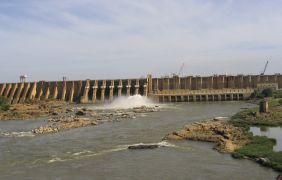Sudanese parliament approves $200 million loan from Kuwait
June 13, 2016 (KHARTOUM) – Sudanese parliament on Monday has ratified a 60 million K.D (about $200 million) loan agreement from Kuwait to finance irrigation projects of Roseires dam in the Blue Nile state following an intense debate on whether or not the loan complies with the Sharia law.

Several legislators refused to approve the loan unless a legal opinion from the Sudan Religious Scholar Council (SRSC) underscoring that the loan doesn’t include usurious interest was obtained.
However, other MPs stressed the need to approve the loan due to the difficult economic conditions experienced by the country.
Meanwhile, a joint report by the parliamentary subcommittee on legislation, justice and human rights and the subcommittee of finance and economic planning and the subcommittee on agriculture, animal resources and forests has revealed that the loan would be repaid within 19 years with an annual premium of 1,5 million K.D.
MP Mubarak al-Nur said the loan must not be approved unless a legal opinion was received from the SRSC and the Islamic Fiqh Academy (IFA) showing that the loan doesn’t include an interest rate.
However, MP Abdel-Rahim Issa said the country is in dire need of the loan particularly under the current economic circumstances.
For his part, MP Mohamed al-Hassan al-Amin pointed to the existence of an independent committee that looks into the compatibility of the loans with the Sharia law, saying the committee belongs to the presidency and includes several religious scholars.
He pointed the committee approved a number of loans in the past and rejected some others.
The head of the subcommittee on agriculture, animal resources and forests Abdallah Masar, for his part, underscored the importance of the loan saying it would help expand the cultivated area.
He added that the loan would change life in the Blue Nile completely and will increase power production and end the conflict in the area.
Sudan’s economy was hit hard since the southern part of the country declared independence in July 2011, taking with it about 75% of the country’s oil output.
The East African nation also suffers from a two-decade economic embargo imposed upon it by the United States in response to its alleged connection to terror networks and human rights abuses.
(ST)
